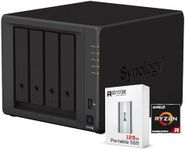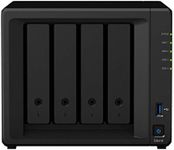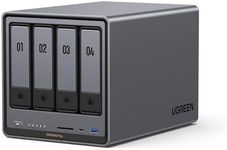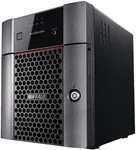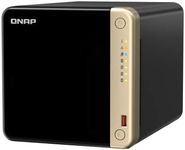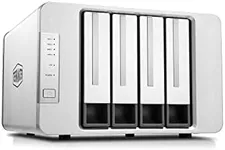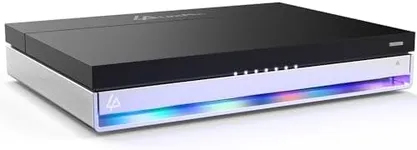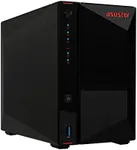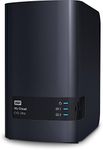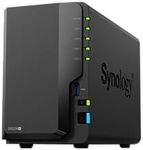Buying Guide for the Best Nas For Homes
When choosing a Network Attached Storage (NAS) for your home, it's important to consider your specific needs and how you plan to use the device. A NAS can serve as a central hub for storing and accessing your files, media, and backups from multiple devices within your home network. Understanding the key specifications will help you make an informed decision and ensure that the NAS you choose will meet your requirements both now and in the future.Storage CapacityStorage capacity refers to the total amount of data that the NAS can hold. This is important because it determines how much data you can store on the device. Storage capacity is typically measured in terabytes (TB). For light usage, such as storing documents and photos, a NAS with 1-2 TB may be sufficient. For more extensive use, such as storing high-definition videos, large media libraries, or backups for multiple devices, you may need 4 TB or more. Consider your current storage needs and anticipate future growth when choosing the right capacity for you.
Number of BaysThe number of bays in a NAS refers to how many hard drives it can hold. This is important because it affects the total storage capacity and the ability to use RAID configurations for data redundancy and performance. A NAS with 1-2 bays is suitable for basic home use, while 4 or more bays are ideal for users who need more storage and advanced data protection. If you plan to expand your storage in the future or require higher data security, opt for a NAS with more bays.
Processor and RAMThe processor and RAM in a NAS determine its performance and ability to handle multiple tasks simultaneously. A more powerful processor and higher RAM are important for running applications, streaming media, and managing large amounts of data. For basic file storage and backup, a NAS with a dual-core processor and 1-2 GB of RAM may suffice. For more demanding tasks, such as media streaming, virtualization, or running multiple applications, look for a NAS with a quad-core processor and 4 GB or more of RAM.
ConnectivityConnectivity options on a NAS include Ethernet ports, USB ports, and sometimes HDMI ports. These are important for connecting the NAS to your home network and other devices. A NAS with at least one Gigabit Ethernet port is essential for fast data transfer speeds. Additional Ethernet ports can provide link aggregation for even faster speeds. USB ports are useful for connecting external drives or printers, while an HDMI port can allow direct connection to a TV for media playback. Consider your network setup and how you plan to use the NAS when evaluating connectivity options.
RAID SupportRAID (Redundant Array of Independent Disks) support allows you to configure multiple hard drives in various ways to improve performance and provide data redundancy. This is important for protecting your data against drive failures. Common RAID levels include RAID 0 (striping for performance), RAID 1 (mirroring for redundancy), and RAID 5/6 (striping with parity for a balance of performance and redundancy). For basic home use, RAID 1 may be sufficient, while more advanced users may prefer RAID 5 or 6 for better data protection. Choose a NAS that supports the RAID level that best meets your needs.
Software and FeaturesThe software and features provided by the NAS manufacturer can greatly enhance its functionality. This includes the operating system, user interface, and additional applications for tasks such as media streaming, file synchronization, and remote access. It's important because it affects how easy the NAS is to use and what you can do with it. Look for a NAS with a user-friendly interface and a wide range of applications that match your needs, such as media server capabilities, backup solutions, and mobile apps for remote access.
Power Consumption and NoisePower consumption and noise levels are important considerations, especially if the NAS will be running continuously in a living space. Lower power consumption can save on electricity costs and reduce environmental impact, while lower noise levels can make the NAS less intrusive. Check the power consumption ratings and noise levels provided by the manufacturer. For a home environment, look for a NAS that balances performance with energy efficiency and operates quietly.

